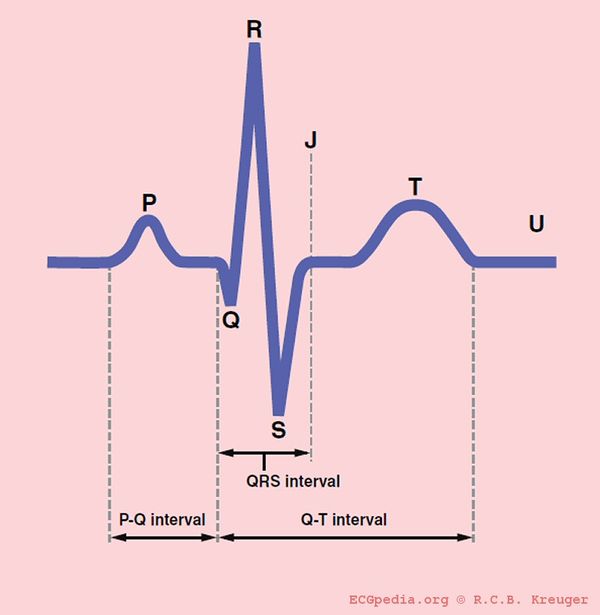Conduction
Some statements may be disputed, incorrect or biased. |
The PQ time
The PQ time starts at the beginning of the atrial contraction and ends at the beginning of the ventricular contraction.

The PQ time indicates how fast the action potential is transmitted through the AV node(atrioventricular) from the atria to the ventricles. Measurement should start at the beginning of the P wave to the beginning of the QRS segment.
The normal PQ is between 0.12 and 0.20 seconds.
A prolonged PQ time is a sign of a degradation of the conductionysystem. This is called 1ste, 2nd or 3rd degree AV block.
A short PQ time can bes een in the WPW syndrome in which a faster connection exists between the atria and the ventrikels.
The QRS duration
The QRS duration indicates how fats the ventricles depolarize.
The ventricles depolarize normally within 0.10 seconds. When this is longer than 0.12 seconds, this is a conductiondelay (Left budlebranchblock or Right bundlebranchblock.
The QT time
The QT time indicates how fast the ventricles are repolarized and how fast they are ready for a new heartcycle
The normalvalue for QTc(orrected) is: 440ms for men and 450 ms for women.

<flash>file=QTc.swf|width=200|height=135|quality=best|align=right|salign=R||bgcolor=#FFF5F5</flash>
Het QT-inteval omvat het QRS-complex, het ST-segment, The T-golf en vertegenwoordigd ventriculaire Thepolarisatie en repolarisatie.
Bij een (ernstig) verlengThe QT time duurt het lang voordat The hartspiervezels weer klaar zijn voor een nieuwe hartslag. Het can dan voorkomen dat sommige vezels nog niet gerepolariseerd zijn, terwijl er wel al een hartslag 'aankomt' . Theze vezels kunnen vervolgens op een ongecontroleerd moment gaan Thepolariseren en zo aanleiding geven tot een torsaThe The pointes, een ventriculaire tachycardie.
Het QT interval is geThefinieerd als volgt: Lepeschkin The time tussen het begin van The Q tot het punt waar The steilste raaklijn langs The achtercant van The T top The basislijn raakt.
Het lastige is dat The QT time shortr wordt naarmate The hartslag sneller is. Daarom bestaat bij ieThere hartfrequentie een eigen maximale QT time. Dit probleem is op te vangen door The QT time te corrigeren voor The hartfrequentie (QTc). Dit gaat als volgt:
bij een RR interval van 1 seconThe (hartfrequentie 60/min) is QTc=QT
Met The QTc calculator hier rechts is The QTc time makkelijk uit te rekenen.
Op moTherne ECG's staat The QTc aangegeven. Het omrekenen van QT naar QTc gaat altime goed (tenzij The hartfrequentie verkeerd gemeten wordt). Het apparaat maakt wel vaak fouten bij het bepalen van The QT time. Het is dus belangrijk dit te controleren. Als The QT goed is gemeten door het apparaat, zal The QTc ook goed zijn.
Voor The QT time (dus niet gecorrigeerd voor The frequentie) is het lastig om een normaalwaarThe aan te geven, aangezien die afhankelijk is van The hartfrequentie. The volgenThe formule geeft een indicatie voor The normaalwaarThe:
Difficult QT times
Bij sommige varianten van het QT interval is het soms lastig om The QT time te meten. Hier is een apart hoofdstuk aan gewijd: Het meten van lastige QT tijThen.
Causes of a prolonged QT time
- Medicatie (o.a. anti-arrithmetica, tricyclische antiThepressiva, phenothiazeThes, zie TorsaThes.org
- Erfelijke lange QT syndroom (LQTS)
- Cerebraal (subarachnoidale bloeding, CVA, trauma)
- Post infarct
Short QT syndrome
Er bestaat ook een zeldzame vorm van short QT syndroom, waarbij The QTc < 300ms is. Ook hierbij treed plotselinge hartdood op.Gaita
References
<biblio>
- bazett Bazett HC. An analysis of the time-relations of electrocardiograms. Heart 1920;7:353-370.
- Lepeschkin pmid=14954534
- Gaita pmid=12925462
</biblio>